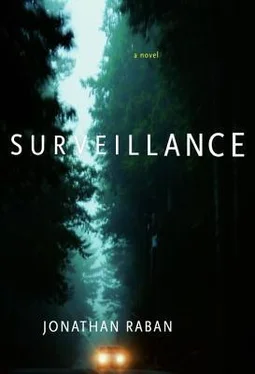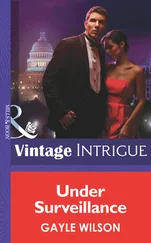“OH, MY MOTHER WAS — she is ! — the bane of my life.” Lucy was driving Minna to Ebey’s Landing. “She lives in Florida now, Coral Gables, two blocks from the Miracle Theatre. She’s a big theater freak. When we lived in Montana, she started this amateur company, the Miles City Players, so she could play all the plum parts. She used to rent the high school auditorium and strut her stuff as Antigone, Hedda Gabler, Cleopatra, Blanche DuBois, and God knows who else. ‘ Someone has to bring culture to the West’ was how she put it. She was born in England, and though she left when she was three, she’s always liked to pretend she’s a Brit. Nobody much ever came to her plays, except for family members, and we’d sit in that vast auditorium, listening to my mom roar out her lines to a nearly empty house. I doubt if anybody else in the West did more to put people off culture for good. If you saw her play Hedda Gabler, you’d want to go off and strangle Ibsen at birth. Of course I just saw it as my own humiliation, and I’d sit there beside my dad trying to make myself invisible.”
“You sound awfully hard on your mom,” Minna said.
“Oh, I am — and how. She was a lesson in how to be a bad mother. I was just about Alida’s age when she told me I had a personality like blotting paper. Can you imagine? I think of myself saying something like that to Alida, and I have to laugh.”
“Parents were different then.”
“None was more different than my mom. She gave my dad a hell of a time, too, for dragging her out to the sticks — which he didn’t. She was on a big nature kick when they moved, reading too much Thoreau and Gene Stratton-Porter, and by the time I was in junior high he and I were in a sort of defensive alliance against her. But I still visit with her once a year. Nowadays she creeps Alida out. She’s the original Wicked Witch of the East.”
“But she is your mother.”
“Yes, and you can see how I take after her, too. Tirading on like this, I sound exactly like her.”
Minna laughed. “I sometimes like to have a good tirade myself.”
“Who do you tirade about?”
“Well, it used to be the branch manager at the bank, but now it’s Augie, mostly. Poor Augie. You know how marriage is.”
“Actually, I don’t. I’ve never been married.”
“Oh, I thought—”
“No, Alida just sort of happened. All by herself — almost.”
“But she still sees her dad?”
“No. They never…got acquainted, you could say.”
“That must have been brave of you.”
“Or just plain selfish. Like I told you, I take after my mom.”
Minna patted her leg. “I think anybody who has a baby by herself is brave.”
“Thank you, Minna.” It was the wind in the open cockpit, surely, that caused the momentary prickle of tears in Lucy’s eyes. She blinked, dropped into second, and accelerated hard out of the bend. “My one big sorrow is that my dad isn’t around to see her now.”
At the crab pen — a makeshift pond sheltered by a tent of flappy plastic sheeting — Minna was as choosy as she’d been in the produce department. In the crowded shallow water, Dungeness crabs were clambering on one another’s backs and clawing fretfully at the air with their pincers. Guiding the crabber with his net, Minna pointed — this one, no that one, or the one over there. Lucy tried and failed to figure out her principle of selection; crabs were crabs to her, though Minna clearly knew otherwise.
They came away with four, two to a bag, and even with the engine turned on, Lucy heard the dry scrabbling of claws in the trunk. Could crustaceans — in darkness, out of their element, destined for the vat of boiling water — feel terror? She was glad to get the car in gear, step on the gas, and drown the noise.
Minna said, “Do you want to talk about your dad passing?”
“Yes. Yes, I think I do. The guy who shot him was crazy. He was being treated for schizophrenia but was off his medication. He had this lousy little twelve-section ranch, a mess of rusted-up old farm machinery. He’d come back from hunting when my dad drove up, was just taking his gun out of the gun rack in his pickup. I think my dad was invisible to him. All he saw was the Bureau of Land Management Jeep, the federal government, and foreclosure. That’s what he pulled the trigger on — I’m certain of it.
“But what hurt, almost as much as losing Dad, was the trial. They held it in Billings instead of Miles City where everybody knew my dad. They started out talking murder in the first degree, then whittled the charge down to involuntary manslaughter on grounds of diminished capacity.
“Okay, I could’ve accepted that. He was crazier than a hoot owl. But it was the jury that got to me — they were on his side. If the judge had let them acquit, they’d have acquitted. It was like to them my dad was a fair target, and Lewis Olson was this folk hero for standing up to the federal government — which is how a lot of people in Montana think. My dad wasn’t my dad: he was Washington, D.C., a federal agent, and Olson was Robin Hood.
“They gave him four years, and he was out in two. I broke down when I heard the sentence. My dad was the kindest man. He loved the ranchers, loved the land, and it was just unimaginable to me how much those strangers hated him.”
“I think, if it had been my dad,” Minna said, “I’d’ve wanted to see him go to the electric chair.”
“Or just locked up for life. But it gets worse. I went to see him in the jail — I had this stupid idea it might bring ‘closure.’ I was even going to write a piece about it, you know, a daughter reconciles herself with her father’s killer: I was like, ‘This is my therapy, and The New Yorker will pay ten grand for it.’
“He’d gotten religion in the penitentiary. He had this mad seraphic smile and sort of vacant eyes, like he was some kind of goddamn saint. He tried to make me go down on my knees with him, in the fucking visitors’ room, and say the Jesus Prayer with him: ‘Lord Jesus Christ, Son of God, have mercy on me, a sinner.’ I mean, not just once, but over and over and over. He’d murdered my dad, and here he was, telling me to confess my sins to him. That’s when I would’ve happily pulled the switch on the electric chair.”
“Funny how really bad people — the most horrible people — always think they’re good people at heart. And they do, too. I’ve seen that.”
“He told me that if I came over to Jesus, I’d meet my dad in heaven. Like it was going to be him and me and my dad, sitting around some celestial campfire, reminiscing about old times on the prairie.”
“You’ve told Alida all this?”
“No. She knows her granddad was murdered, but not about the Jesus stuff. She doesn’t know Lewis Olson keeps on writing to me — just to warn me that if I don’t repent I’ll never see my dad again. Then he brings me up to date with his stupid news, like he and I are family. Blue envelopes and block capitals. The sight of a blue envelope in the mail makes me want to vomit. I have a Google Alert on his name, hoping to see his death notice in the Billings Gazette or whatever. But you’d be amazed how many Lewis Olsons there are. Mostly I get the latest dope on some New Zealand glass artist.”
Again, the island was too small for the conversation; again, Sunlight Beach Road came too quickly into view. But even though — or, rather, because — Lucy had done all the talking, she’d found out one thing crucial to the GQ piece: why Augie married Minna.
ON SUNDAY AFTERNOON in the Dew Drop Inn on Aurora, Charles O was waiting for his girl to come out of the bathroom.
Читать дальше












